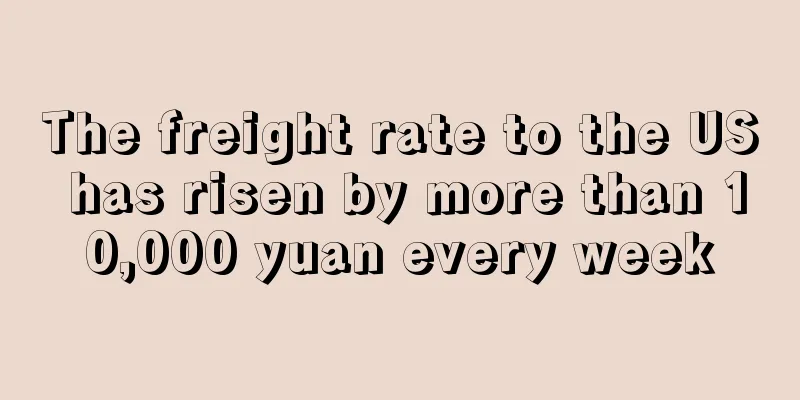Temu has issued a new policy, sellers: Sooner or later, they will be squeezed out

|
In the spirit of not being able to defeat those sellers who joined Temu, how are they doing now?
After Temu introduced a new price-cutting policy in the middle of this month , it released a new quality inspection policy at the end of the month. The platform has raised the quality inspection requirements and has the final right of interpretation for the return of the goods in the warehouse. The seller couldn't help but sigh: "I can't do it to keep the price to the lowest and demand quality at the same time!"
Temu's combination of quality and price has caused sellers to worry. Some of them have chosen to withdraw, while others believe that it is only a matter of time before they are squeezed out of the platform.
Temu has issued a new quality inspection policy and reserves the final right of interpretation for the return of goods received
Recently, Temu informed sellers that the platform has strengthened its quality inspection requirements, and the newly added policy reserves the final right of interpretation for the return of warehoused goods.
According to the seller Wanli, the platform does not send emails to sellers under the new rules. They are usually informed through pop-up messages and announcements in the seller group. Temu's quality inspection is very strict. The platform compares the product pictures in the system and looks very carefully at the details. Once the product is found to be inconsistent with the picture, the goods will be returned. For example, in the picture below, if the actual product is different from the picture details, it will be judged as unqualified. (Unqualified products inspected by Temu)
Seller Wang Lin said that a pair of glasses sent to Temu had a scratch and were returned. The product itself cost only a little over one yuan, but SF Express deducted more than 20 yuan for the return. The most disgusting thing is that the platform checks the samples sent. If 2 of the 100 samples sent have problems, it will directly return the whole package without discussing it with you. Some peers who cleared their inventory for two or three yuan were also returned one after another.
" The quality inspection standards of each of their warehouses are inconsistent. The same goods are qualified in some warehouses but not in others. Products that have been sold for several months are unqualified when they are stocked in new warehouses . If the shipment quantity is large, the entire batch will be sent out and returned in batches. " Wan Li said.
Many sellers have reported that if the goods entering Temu’s warehouse fail the quality inspection and the seller and the platform cannot reach an agreement, the goods will be returned piecemeal or in full boxes, and SF Express will be required to pay on delivery.
According to the new regulations, Temu has the final right of interpretation for the return of goods in its warehouse. Combined with the new bidding policy issued about half a month ago, Wang Lin seemed helpless: " The platform requires low prices and good quality, which is contradictory in itself . "
Li Tianlin is just as helpless as Wang Lin. He has his own factory, but it is still difficult to balance low prices and quality. In Li Tianlin's opinion, Temu first let sellers place orders, and tasted the sweetness first, and then the buyers began to "act": We found a cheaper product on 1688 that is exactly the same as yours, and others can offer it at this price. They bargained and asked sellers to prepare the goods first. When the sellers' large goods arrived, the buyers asked them to hold an event, and told the sellers how much the platform would bear, and everyone would lose a little and give the profit to consumers. At this time, the sellers have already shipped the goods. If you do not agree to hold the event, the buyers will ask you to return the goods.
Now the new bidding policy and quality inspection requirements have come at the same time. If the platform wants inferior products, then I can replace all the spare parts with junk ones, but it also has requirements on quality. If the quality is not up to standard, the after-sales refund will be borne by the seller. It's a scam anyway!
Sellers: It’s only a matter of time before we are squeezed out by the platform
Faced with the new contradiction, Li Tianlin felt a chill coming, and he decided to completely withdraw from the Temu platform after clearing out his inventory. Like Li Tianlin, more sellers backed off in the face of the harsh new policy.
An Amazon seller said that some of his colleagues who do Temu have 10,000 orders a day, but he still has to clear out a few hundred orders to keep up, so he is ready to withdraw after clearing out the inventory. This may be a personal problem rather than a platform problem. As a seller, if you feel that you are suitable for Temu, it is not a bad thing to have an extra sales channel. If you are not suitable, just focus on your own field.
Many Temu sellers are afraid that they will not make money, lose the goods, and be fined... Just like the current inconsistent quality inspection standards, it makes many people suspicious. Some sellers speculate that the platform may be so chaotic in order to fine the sellers later.
However, at this stage, there are still sellers who are doing well on Temu, and one of them is Wang Dong. Wang Dong works on Amazon in a central city. In November last year, he met Temu's investment manager through a friend's recommendation. At that time, the platform happened to be looking for categories where Wang Dong had supply chain advantages. The investment manager encouraged him: "This product is relatively scarce, so hurry up and get on it."
Before the product was put on the shelves, Wang Dong learned about the relevant policies of the Temu platform. He set a high price at that time, and offered a product that was originally priced at around 30 yuan at 70 or 80 yuan. When buyers further lowered the price, it was basically within their expected range. After operating for a period of time, Wang Dong's products were once again undermined by buyers, but he was still profitable.
At present, Wang Dong's business in Temu platform is growing steadily, which has greatly boosted the confidence of the company's employees. However, facing more players and the platform's tightening policies, Wang Dong feels worried.
Hidden worry 1: Profits keep decreasing. Now the platform is constantly attracting investment to enrich their categories. If the categories are enriched to a certain extent, they will soon reach an extreme, and at this time the sellers’ profits will definitely not be maintained.
Concern 2: Stocking is put in the hands of the sellers. In order to ensure sufficient supply, Temu's buyers will set the sellers' stocking quantity to a relatively large level, forcing the sellers to constantly stock up. Stocking is very risky, and the goods cannot be returned to the factory if they are not sold out.
Concern 3: Sooner or later, they will be squeezed out. Most cross-border e-commerce sellers are traders and middlemen. When Temu's product categories become rich to a certain extent, it will first squeeze the profits of middlemen, just like Pinduoduo in China, which will squeeze out traders first and then squeeze the profits of factories. The original intention of the platform is to eliminate the middleman fees, and it is only a matter of time before traders are eliminated.
An industry insider analyzed Temu's business model as follows: In the early stage, they frantically recruited investors, and basically all the product prices were approved, so they obtained a large supply of SKUs and asked merchants to prepare goods in their warehouses. After the data came out, they began to frantically lower the prices of products with a little order. Anyway, the sellers have already prepared the goods in the warehouse, and if you refuse to verify the price, they will be removed from the shelves and returned. They frantically spent money to attract new users and advertisements to attract new users, regardless of the cost to increase various data, and then raised funds and went public to cash out. In short: small profits but quick turnover, saving all costs, grabbing all the wool, and harvesting more traffic.
Even though Temu is now rapidly placing orders and is gaining popularity, Wang Dong still believes that it is not a platform that can be operated for a long time. As a trader, he just seized the opportunity and reaped the dividend of information asymmetry in the early stage of the platform's development. His logic is to do it if there is profit, and quit and move to other opportunities if there is no profit.
Wang Dong mentioned the other hot spots that sellers are currently paying attention to, namely the full hosting model . Now, Temu, SHEIN, AliExpress and TikTok, the "four little dragons going overseas", have fully embraced the full hosting model and are competing to extend olive branches to cross-border sellers. Wang Dong has tried to deploy these platforms to share the operating risks. In his opinion, compared with Amazon's operation, the full hosting model is easier, and only by actively trying new platforms and new business models can we continue to make money in the hot spots.
Like Wang Dong, many cross-border trade sellers are actively trying to embrace full trusteeship while sticking to their home base of Amazon. They plan to put their eggs in several baskets so that they can respond quickly at different stages.
(Wan Li, Wang Lin, Li Tianlin and Wang Dong are pseudonyms in this article) Temu New Deal |
<<: As the US dollar exchange rate rises above 7.1, it’s time for sellers to replenish their blood!
>>: Cannes Film Festival boosts overseas gem consumption, Ali International Station gem sales triple
Recommend
To build a DTC brand, sellers should pay attention to these five issues!
According to Wikipedia, DTC (Direct-to-consumer) ...
What is Shixin Huida Freight? Shixin Huida Freight Review, Features
Shixin Huida Freight provides one-stop logistics ...
It’s hard to bear! Amazon’s “Business Scope” review is coming again…
Amazon sellers have been worried about sudden rev...
Shein and Temu are popular in the United States, giving Amazon a headache
According to foreign media reports, affected by i...
2021 US online holiday sales grew 10%, a slower pace
Although U.S. online holiday sales exceeded the $...
After being criticized wildly by netizens, is Temu no longer a popular commodity in the eyes of Americans?
However, similar to the public opinion environmen...
What is Packeta? Packeta Review, Features
Packeta was founded on July 24, 2008. It is an in...
Good news for sellers! Amazon has more new policies
Amazon sellers are facing one trouble after anoth...
What is magnalister? magnalister Review, Features
Magnalister Listing your products on different ma...
What is Caraa? Caraa Review, Features
Caraa is a New York City-based athletic bag and ac...
What is Latestdeals? Latestdeals Review, Features
Latestdeals is one of the largest deal communities...
What is Zhejiang Chouzhou Commercial Bank? Zhejiang Chouzhou Commercial Bank Review, Features
Zhejiang Chouzhou Commercial Bank was founded in 1...
What is Fujian Land Port Group? Fujian Land Port Group Review, Features
Fujian Land Port Group Co., Ltd. (hereinafter refe...
Musk and Trump had a live conversation, and Anker became the "biggest winner"!
In the past two days, the news that Trump is prom...
What is Dolphin Japan Warehouse? Dolphin Japan Warehouse Review, Features
Dolphin Japan Warehousing Center is a product of ...









